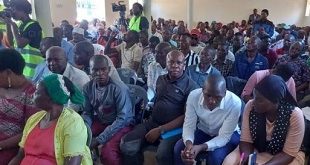
Every day, doctors, nurses and other health professionals are presented with situations that demand empathy and compassion. Whether telling a 40-year-old man with cancer he doesn’t have long to live, or comforting an elderly woman who is feeling anxious, the health professional needs to be skilled in understanding what the other person is going through, and respond appropriately.
By: Sue Dean.
With more demand on doctors and nurses and a push for quicker consultations, clinical empathy is being dwarfed by the need for efficiency. But this does not mean patients have stopped wanting to be treated in a caring and empathetic manner. And there is a growing body of evidence that this need is often not being met.
In the novel To Kill a Mockingbird, Atticus Finch tells his daughter Scout that “you never really understand a person until you consider things from his point of view … until you climb into his skin and walk around in it”. This is empathy – where one identifies with another’s feelings. It involves compassion and the ability to understand and respond to the feelings of others. Often, an empathetic response leads to a caring response.
Empathy is different to sympathy which is described as feeling sorry for another person. This does not require us to understand the other person’s point of view, but is an automatic, emotional response. In health care, feeling sympathy for another person can overwhelm us with sorrow and often preclude us from helping.
In recent times, poor communication, including lack of empathetic and caring behaviours, has resulted in an increasing number of complaints against health professionals in Australia.
Shocking cases of maltreatment at a United Kingdom public hospital between 2005 and 2009 reveal the extreme consequences of negligence, poor communication and lack of empathy in health care. Incidents ranged from patients being forced to drink from flower vases to lying in their own excrement. More than 300 deaths were directly linked to this neglect.
At the crux of the recommendations made in a report of the inquiry into the incidents was the need for improved communication between health care workers and patients. Empathy is fundamental to effective communication. For doctors and nurses, this means placing the patient at the centre of care. This skill leads to increased levels of satisfaction not only in patients but also the doctors and nurses. Importantly, it is also associated with improved patient outcomes. Why are nurses and doctors losing empathy?
Technology has greatly contributed to health professionals’ diminishing levels of empathy.
It has come at the cost of changing the way doctors and nurses interact with their patients. Because there are fewer opportunities for direct patient contact, it hinders the ability to develop a rapport with patients, monitor their non-verbal communication and elicit feedback on the interaction.
For instance, touch has historically been a large part of the work of a nurse. When nurses hold a patient’s hand or arm to take their pulse, for instance, it contributes to the kind of connection that has been shown to release the feel-good hormone oxytocin.
 The Independent Uganda: You get the Truth we Pay the Price
The Independent Uganda: You get the Truth we Pay the Price



George N. Kamau’s book: Why Beetles Roll Cow Dung (2003), comes to mind when I consider the symbiotic relation Ugandans have with Uganda. In the story, the beetle was able to get enough supply of cow dung in which to lay her horde of eggs. In turn, when the eggs matured into beetles, they got together and cleaned the cow’s home. They were the ever present, well paid janitorial and cleaning service. Uganda must be able, like the cow, to provide what is needed for the workforce to thrive. Most, if not all all patients who come before a health care provider need a social worker, a psychologist, an experienced proxy and a supportive family. Uganda has tended to place the burden of the “sick” on clinicians. A good referral system is necessary for services to be considered standard and fulfilling. Why should the primary physician be the one to give the dismal parting words when it should be the specialist in a long-term care facility. Uganda has very well trained health care providers but it has not provided the full range of services. The extended clan-family is another entity suffering from this burden. It is no wonder, Ugandans do not have reserve money to invest in say, stocks which may be considered a luxury or exotic. It is no wonder, we have we think those next to President Museveni “fell into things.” Uganda, needs to embrace quality indicators and allow this to inform policy and programming. We shall get oil, produce and export jet fuel and not sweet crude. But without the move toward quality in what we do, we shall eventually be like the proverbial A 52 year old person living with HIV in Bukomansimbi District is able to get her ARVs regularly and her children who work as touts in Kampala visit her regularly. They support their mother and the relatives in Bukomansimbi. They have been doing this since 1997. James Ogwaro holds an LLM and MBA. He lectures at Mukono University, Makerere University and Kyambogo. He has been doing this since 2008. Uganda has existing institutions which include the Taxing entity, civil service, the army, courts of law, Legislature, security agencies, the Executive and local governments and public agencies like the Schools, Hospitals, Road network, Central bank and security system. We may experience longevity but the difference is in the quality of delivery, service life and wellness of people. For the 52 year old person living with HIV in Bukomansimbi District may be able to get her ARVs regularly. Her children who work as touts in Kampala may be able to visit her regularly, but the state has to have disability support. It is breaking an already broken family and clan support system without putting back into it. James Ogwaro may hold an LLM and an MBA. He may have lectured at Mukono University, Makerere University and Kyambogo since 2008, but who looks into his burnout issues? How much deeper does he engage his students? What would his ideal student output? There is a direct link between stature, quality and state presence. Uganda is a good country, it has excellent leadership structures, is multi-ethnic and gifted by nature. All these are advantages if used well. Excellent health care workers will be quality providers if supported in executing their duty professionally.